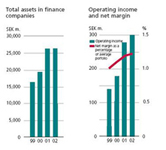- Academic Integrity Tutorials
- Student Tutorial
- Plagiarism
- Plagiarism in Graphs, Charts, Figures or Images
Student Tutorial: Plagiarism in Graphs, Charts, Figures or Images
Definition
Using graphs, charts, figures or images from a source without acknowledging that another person developed them is considered plagiarism.
Example Source
Source: Scania. Annual Report 2002. 2003. 31 Aug. 2005. https://www.annualreport.scania.com/downloads/scania_annual_report_2002.pdf
Draft
Scania is a Scandinavian company that manufactures parts for large semi-trucks. The company's profits have been rising steadily throughout the years, as can be seen in the figure below.

Explanation
This writer has lifted a table from a secondary source and used it directly in their draft. By doing this, the writer has used another person's ideas, calculations and words without acknowledgement. This lack of citation constitutes plagiarism.
To eliminate this type of plagiarism, you should provide a citation for any tables, graphics, figures or images you acquire from secondary sources. You may also consider translating the information from tables into your own words. Remember, even if you use only information from a graph, chart, figure or image in your paper, you still need to acknowledge your source by providing proper citation.
- Student Tutorial
The Academic Integrity Tutorial for Students is licensed under a Creative Commons Attribution-NonCommercial-ShareAlike 4.0 International License.
